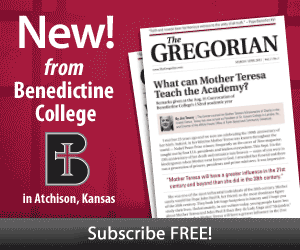Beyond Politics at the White House: What the Pope said, and what he didn’t say
As I listened to Pope Benedict XVI’s speech at the White House this morning, I thought of a very wise statement about God: “He loves us just the way we are, but he loves us too much to let us stay that way.”
All popes follow this method, the one established by Jesus: Communicate unconditional love specifically to every person and nation, highlighting whatever is good and true in their history and ideals, while withholding particular criticisms. And boldy issue ethical and religious challenges in general terms, with the hope that they will penetrate and transform individual consciences.
If we don’t keep this in mind during this papal visit, it will be easy to misinterpret the Pope’s unconditional love as unconditional approval for all we do. I heard some of that happening during the post-speech spin. Yes, the pope was unquestionably affirmative about America. But I thought Fr. Richard John Neuhaus overreached when, on EWTN, he said it was a “very positive description of America’s role in the world and the part America plays in upholding the Universal Declaration of Human Rights.” With all due respect to Fr. Neuhaus, I don’t think the Pope’s words went that far.
If you follow papal trips you notice that every pope affirms all that is good about a visited nation. Whether it’s this papal visit, or a visit to political hotspots Turkey or the Middle East, politicians will invariably try to draw the Church to take sides in political conflict. But popes never let that happen. What they will do—which is what Pope Benedict XVI did in this speech—is boldy state the universal moral principles that should guide consciences, and let everyone, as best they can, draw the intended conclusions.
The Catholic theologian Roman Guardini first opened my eyes to this essentially Christian approach. He said that when you affirm people, they want to become deserving of your affirmation, which leads them towards the good. This is much more powerful, and effective, than condemnation, but less satisfying for us poor sinners (the saints have an easier time of it). This approach frustrates those of us who are intensely political. For instance, there are some who opposed the war in Iraq (like me) who want the Pope and the Church to more boldly denounce what happened. I sometimes feel that way. But that’s not the way of the Church. The Church’s role is to bring back together God’s lost children. As important as morality, life, peace and justice are, in the end those ideals will not be served if the Church drives God’s children apart by taking sides in political debates. The only true way to realize those ideals is if they flow out of the lived communion, the unity, which can only be established through Christ.
Without that understanding of the Church, observers will continue to misinterpret the Pope’s words during this trip. They’ll interpret his gestures and words of unconditional love as approval, when they’re expressions of his fatherly affection. They’ll also miss the clear challenges implied by his references to peace, justice, and solidaity. In other words, they’ll hear what they want to hear. But that’s okay. The Pope—and the Church—is patient, fully aware that we’re not in heaven yet, and, in what I found to be the Pope’s most profound phrase, “freedom is ever new.”









By Dave AT 04.16.08 09:19PM Not Rated
I mean no disrespect to Fr. Neuhaus or EWTN (most of what they teach is solid), but even he was seeing what he wanted to see as you say.
Not only him but I found myself wanting to do the same thing about the War in Iraq. “Get the hell out of there!” But both of us would be (are) wrong in doing this.
I’m really just excited he’s here.